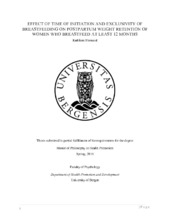Effect of time of initiation and exclusivity of breastfeeding on postpartum weight retention of women who breastfeed at least 12 months
Master thesis
Permanent lenke
https://hdl.handle.net/1956/12142Utgivelsesdato
2016-05-06Metadata
Vis full innførselSamlinger
Sammendrag
Breastfeeding is a fundamental health promotion practice. Decades of research have documented mental, physical, and social benefits of breastfeeding for the child and the mother. However, the literature is inconclusive about one issue of great concern to many mothers and health care professionals: is there a significant relationship between breastfeeding and postpartum weight retention? Breastfeeding is a complex practice with many dimensions - timing of onset, duration, and whether it undertaken with or without complementary feeding - functioning in combination with myriad other factors such as maternal age. One aspect of this issue is without controversy: the importance to both maternal and child health generally of long-term breastfeeding, to one year of age and beyond. Yet the question remains if there are optimal patterns of breastfeeding that reduce the risk of postpartum weight retention. Two aspects of the breastfeeding/postpartum weight retention question require closer examination: the possible effect on weight retention of the timing of the initiation of breastfeeding, and of the duration of exclusive breastfeeding. Breastfeeding's complexity exacerbates the methodological challenges inherent in the study of health behavior. There is room for improving how concepts and variables are defined and measured in breastfeeding research, and scientific standards have not yet been widely agreed upon. Thus, methodological weaknesses in the breastfeeding literature contribute to the confusion regarding whether there is a connection between breastfeeding and postpartum weight retention.
